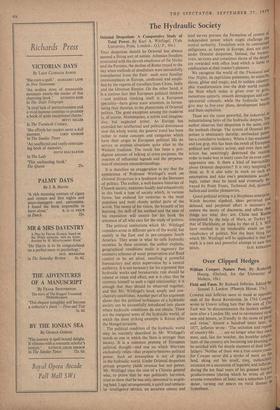The Hydraulic Society
THAT despotism should be Oriental has always seemed a fitting sort of notion. Athenian freedom contrasted with the slavish obedience of the Medes and the Persians, the decline of Rome traced to the day when methods of absolutism were successfully' transplanted from the Fast : such were familiar commonplaces in Europe, confirmed and ampli- fied by the reports of travellers from China, India and the Ottoman Empire. On the other hand, it is a curious fact that European political thinkers —and political thinking itself is a European speciality—have given scant attention, in formu- lating their theories, to the phenomena of Oriental politics. The great exception among the moderns is, of course, Montesquieu, a subtle and imagina- tive, but neglected writer. As Europe has extended her intellectual and political dominance over the whole world, the general trend has been rather to make concepts and categories which have their origin in European political life do service to explain situations quite alien to the Western tradition. The result has been a pro- digious amount of talking at cross-purposes, the creation of influential legends and the perpetua- tion of obstinate misunderstandings.
It is therefore no exaggeration to say that the appearance of Professor Wittfogel's work on Oriental Despotism is a landmark in the literature of politics. The author, a well-known historian of Chinest society, examines lucidly and exhaustively in this book a type of society which, in various forms, has endured for centuries in the most populous and most closely settled parts of the world. The sweep of his vision, the breadth of his learning, the skill of his method and the ease of his exposition will ensure for his book the attention of all who care for the study of politics.
The political institutions which Mr. Wittfogel considers arose in different parts of the world, but mainly in the East and in pre-conquest South America. They arose in what he calls hydraulic societies. In these societies, the author explains, geographical conditions make it ne.gessary for extensive schemes of water preservation and flood control to be set afoot, entailing a powerful bureaucracy and strict supervision by a central authority. It is not necessary for his argument that hydraulic works and bureaucratic rule should be related as cause and effect, nor is it clear that he commits himself to such a rigid relationship; it is enough that they should be observed together, and this Mr. Wittfogel's book amply and con- clusively establishes. Another part of his argument shows that the political techniques of a hydraulic society can be successfully introduced into places where hydraulic conditions do not obtain. These are the marginal areas of the hydraulic world, of which the most striking example is Russia after the Mongol invasion.
The political condition of the hydraulic world may be succintly described in Mr. Wittfogel's words as one in which the State is stronger than society. It is a common premisi of European political thought—and one on which Marxistn exclusively relies—that property bestows political power. Such an assumption is out of place in the hydraulic world. Under Oriental despotism private property yields revenue but not power. Mr. Wittfogel cites the case of a Chinese general who, to prove that he was politically harmless, tried to show that he was only interested in acquir- ing land. Legal arrangements, a quick and tentacu- lar intelligence service, an accurate census and
land survey prevent the formation of centres of independent power which might challenge the central authority. Feudalism with its contractual obligations, as known in Europe, does not exist under Oriental despotism. Instead, the bureau- crats, servants and sometimes slaves of the despot are rewarded with office land which is liable to confiscation at their master's pleasure. We recognise the world of the Thousand and One Nights, its capricious potentates, its eunuchs, slaves, glitter and magic, and its sudden catastro- phic transformation into the drab world outside the West which today is given over to grim, monstrous upstarts, smooth demagogues and con- spiratorial colonels; while the hydraulic works give way to five-year plans, development boards and State capitalism.
These are the more powerful, the industrial or industrialising heirs of the hydraulic despots. The author observes that despotism is the same, onlY the methods change. The system of Oriental des- potism is obstinately durable; unchecked power has a cumulative tendency. Where it has weakened and lost grip, this has been the result of European political and military action; and even then such action has unwittingly destroyed the existing order to make way in many cases for an even more oppressive one. Is there a kind of inevitabilitY about Oriental despotism? It is very tempting to think so. It is also safer to work on such an assumption and take one's precautions accord- ingly, rather than be lured and eventually be- trayed by Point Fours, Technical Aid, pictorial ballots and similar pleasantries.
Good political writing is a Sisyphean enterprise. Words become slipshod, ideas perverted and debased, and perpetual effort is necessary to restore the sanity of discourse, and affirm that things are what they are. China and Russia interpreted by the help of Marx, or Turkey by that of Durkheim, or India by that of J. S. mill have resulted in an intolerable strain on the vocabulary of politics. Not the least thing for which Mr. Wittfogel will be applauded is that his work is a rare and powerful attempt to ease this
































 Previous page
Previous page